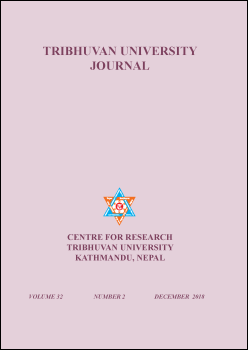Targeted Intervention Services for People Who Inject Drugs in Nepal
DOI:
https://doi.org/10.3126/tuj.v32i2.24718Keywords:
NCASC (National Centre for Aids and STD Control), Stigma and discrimination, Police harassment, Service gap, needle and syringe, HIV, Blood borne disease, Nepal Government, Primary Health Care (PHC), Drop in Centre (DIC), Project, Problem solvingAbstract
This study was conducted in the several districts of TI project implemented areas where 102 respondents as a sample size and 12 were the Female Who Injects Drugs (FWID): Kathmandu, Lalitpur Kaski, Tanahu, Chitwan, Kailali, Sarlahi and Jhapa respectively. For the study 10-15 participants enrolled from each districts. The major findings of the study are based upon the Drug User’s perspectives includes: PWIDs were unable to receive services from the Dropping in Centers (DIC) due to the extreme police harassment in the Kaski district. Using contaminated syringe, sharing of used syringe in a group, stolen syringe from the hospitals were the common trend identified during the gap of the project for PWIDs by Nepal Government in Kaski district, Tanahu district and Chitwan district respectively. This study reveals that there was lack of standard intervention protocol and guidelines for the PWIDs community. Furthermore, comprehensive package as well as multi years project was felt to be necessary without any gaps in the services to reduce the HIV transmission, HCV and Hep B among the PWIDs.
Downloads
Downloads
Published
How to Cite
Issue
Section
License
This license enables reusers to distribute, remix, adapt, and build upon the material in any medium or format for noncommercial purposes only, and only so long as attribution is given to the creator.
© Center for Research, Tribhuvan University

